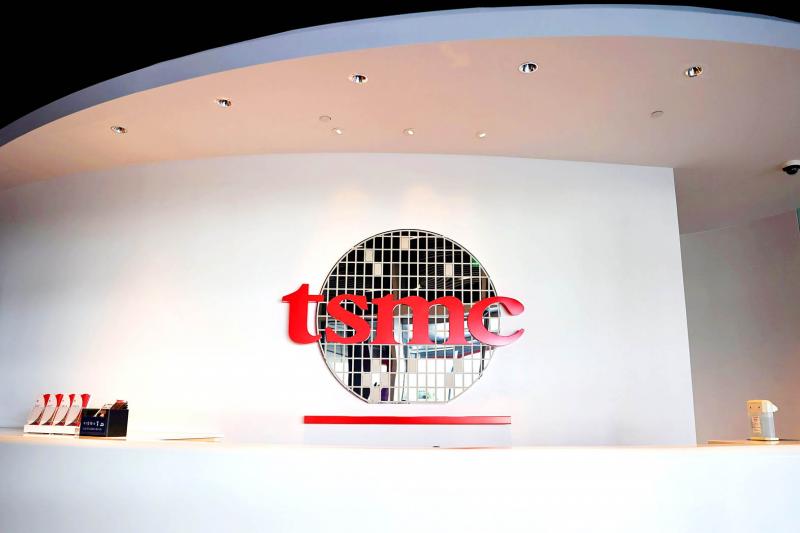Taiwan Semiconductor Manufacturing Co (TSMC, 台積電) yesterday said that it had responded to a request for chip supply chain information from the US Department of Commerce.
TSMC said in a statement that it had submitted answers to a questionnaire issued by the department, which asked that it be completed and returned by yesterday to address a global chip supply shortage.
The chipmaker said that it did not disclose any confidential information about its customers.

Photo: Ann Wang, Reuters
On Sept. 23, the US government held a meeting with TSMC, Samsung Electronics Co, Intel Corp and other companies on progress made by the industry to address issues in the semiconductor supply chain, and issued a request for information (RFI) on the subject on the same day.
The RFI asks companies in the semiconductor supply chain to “voluntarily share information about inventories, demand and delivery dynamics.”
Its aim is to “understand and quantify where bottlenecks may exist,” a statement on the department’s Web site reads.
Other firms, including Micron Technology Inc, Western Digital Corp and United Microelectronics Corp (聯電), also made submissions ahead of yesterday’s deadline, the department said.
The global chip supply shortage has affected the auto industry worldwide.
Last month, TSMC chairman Mark Liu (劉德音) said in an interview with Time magazine that chip hoarding was exacerbating the global supply shortage.
Local media yesterday reported that TSMC was among 23 semiconductor companies worldwide that had submitted their answers to the questionnaire, and that the data provided by the Taiwanese chipmaker included a forecast indicating that the company’s sales for this year are expected to reach US$56.6 billion, up 24.4 percent from a year earlier.
A similar forecast was disclosed at TSMC’s investor conference last month.
Minister of Economic Affairs Wang Mei-hua (王美花) said that her ministry would not intervene in how Taiwanese semiconductor firms submit their questionnaires to the US government, adding that it was not appropriate for the ministry to know what information firms had submitted.
However, Wang said she had faith that Taiwanese semiconductor suppliers would protect sensitive customer data.
Tech companies in South Korea — home to Samsung and SK Hynix Inc — are preparing for a “voluntary submission” of relevant information, the South Korean Ministry of Economy and Finance said in a statement on Sunday, adding that the firms have been negotiating with the US on the extent of data to be submitted.
South Korean media reports have said the companies would only “partially comply” with the information request.
While the department’s request is voluntary, US Secretary of Commerce Gina Raimondo told industry representatives that the White House might invoke the Defense Production Act or other tools to force their hands if they do not respond.
Washington’s request sparked controversy in Taiwan and South Korea, with some fearing that the US is demanding that companies hand over trade secrets.
There have also been concerns in China that the US could use materials provided by TSMC and others to sanction Chinese firms.

TRUST: The KMT said it respected the US’ timing and considerations, and hoped it would continue to honor its commitments to helping Taiwan bolster its defenses and deterrence US President Donald Trump is delaying a multibillion-dollar arms sale to Taiwan to ensure his visit to Beijing is successful, a New York Times report said. The weapons sales package has stalled in the US Department of State, the report said, citing US officials it did not identify. The White House has told agencies not to push forward ahead of Trump’s meeting with Chinese President Xi Jinping (習近平), it said. The two last month held a phone call to discuss trade and geopolitical flashpoints ahead of the summit. Xi raised the Taiwan issue and urged the US to handle arms sales to

A magnitude 5.6 earthquake struck off the coast of Yilan County at 12:37pm today, with clear shaking felt across much of northern Taiwan. There were no immediate reports of damage. The epicenter of the quake was 16.9km east-southeast of Yilan County Hall offshore at a depth of 66.8km, Central Weather Administration (CWA) data showed. The maximum intensity registered at a 4 in Yilan County’s Nanao Township (南澳) on Taiwan’s seven-tier scale. Other parts of Yilan, as well as certain areas of Hualien County, Taipei, New Taipei City, Taoyuan, Hsinchu County, Taichung and Miaoli County, recorded intensities of 3. Residents of Yilan County and Taipei received

Taiwan has secured another breakthrough in fruit exports, with jujubes, dragon fruit and lychees approved for shipment to the EU, the Ministry of Agriculture said yesterday. The Animal and Plant Health Inspection Agency on Thursday received formal notification of the approval from the EU, the ministry said, adding that the decision was expected to expand Taiwanese fruit producers’ access to high-end European markets. Taiwan exported 126 tonnes of lychees last year, valued at US$1.48 million, with Japan accounting for 102 tonnes. Other export destinations included New Zealand, Hong Kong, the US and Australia, ministry data showed. Jujube exports totaled 103 tonnes, valued at

BIG SPENDERS: Foreign investors bought the most Taiwan equities since 2005, signaling confidence that an AI boom would continue to benefit chipmakers Taiwan Semiconductor Manufacturing Co’s (TSMC, 台積電) market capitalization swelled to US$2 trillion for the first time following a 4.25 percent rally in its American depositary receipts (ADR) overnight, putting the world’s biggest contract chipmaker sixth on the list of the world’s biggest companies by market capitalization, just behind Amazon.com Inc. The site CompaniesMarketcap.com ranked TSMC ahead of Saudi Aramco and Meta Platforms Inc. The Taiwanese company’s ADRs on Tuesday surged to US$385.75 on the New York Stock Exchange, as strong demand for artificial intelligence (AI) applications led to chip supply constraints and boost revenue growth to record-breaking levels. Each TSMC ADR represents